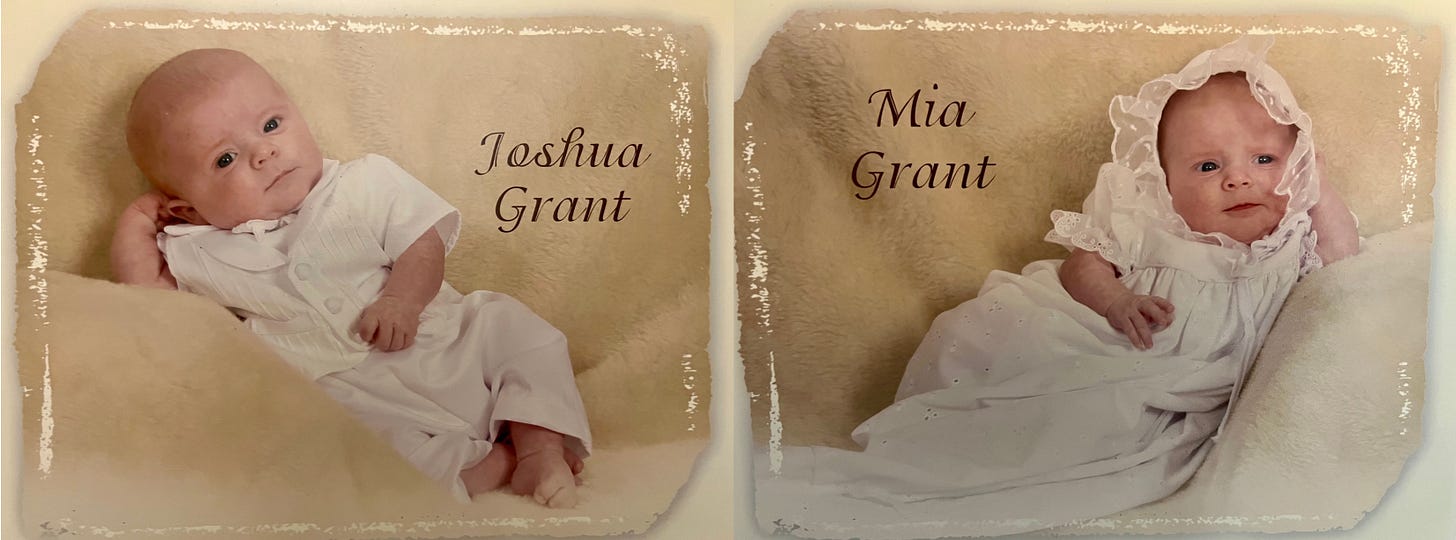Well… I am torturing myself going through pictures of my twins who are getting ready to graduate this weekend. Thoughts run through my head like… “How did this happen?” or “Wasn’t it just yesterday that I would take them for walks in our double stroller?” or “Do they know I am pretending I can’t hear them when they ask about social media?”
Now they are about to head off into the world ready to discover who they are. What advice could I give them that I think would really help them the most in this part of their journey?
“Don’t think.”
That’s part of the wisdom I picked up from a thought-provoking book I recently finished - Don’t Believe Everything You Think by Joseph Nguyen. The main idea is elegantly straightforward: much of our suffering comes not from what happens to us, but from our own thoughts.
Ironically, this made me pause and start analyzing—which, according to Nguyen, is exactly where we go wrong! Why is thinking itself a problem?
Nguyen explains that it’s not the events in our lives that trouble us, but the stories we tell ourselves about those events. As he puts it, “It’s not WHAT we’re thinking about that is causing us suffering, but THAT we are thinking.”
So why does thinking lead to suffering? Because our minds are experts at inventing stories that aren’t necessarily true, but we buy into them anyway, causing ourselves needless stress and anxiety. Take a simple example: you text a friend about a recent get-together and get no response. Suddenly, your mind starts spinning tales—maybe your friend is upset with you—and you spend hours worrying, only to later discover their phone simply ran out of battery. That spiral of anxious thoughts? That’s the unnecessary suffering Nguyen is talking about.
How this book applies to my graduates
From experience, I know my twins will be facing: identity formation, career choices, relationships, and the constant comparison trap of social media. Their minds are battlegrounds of thoughts like:
“What if I choose the wrong major?”
“Everyone else seems to have it figured out.”
“I’m not smart/attractive/talented enough.”
These kids already have enough actual problems without their thinking creating more! This book offers them a simple but powerful tool: the ability to recognize that thoughts are just thoughts, not facts.
What made me more of a believer in this idea is that Nguyen doesn’t ask them to battle negative thoughts with positive ones (which, let’s be honest, rarely works when you’re in a spiral). Instead, he suggests something more powerful—recognizing thoughts for what they are and letting them pass through without attachment.
Let me pause for a moment to say that I truly believe God is the ultimate source of guidance. But since His answers often come in His own timing, there will inevitably be seasons in my kids’ lives when it feels like they’re waiting in silence. My hope is that during those times, they’ll turn to the best books for learning and growth, trusting that every good thing ultimately comes from God. Sometimes, the answers we’re seeking can be found in the wisdom of a well-chosen book. Nguyen’s book, in particular, offers practical insights for those in-between moments—when you’re caught in that uncomfortable space between asking and receiving.
Nguyen’s approach - pausing, questioning thoughts, and finding peace in the present moment - mirrors many spiritual practices. He even has a helpful acronym PAUSE:
P—Pause and take deep breaths
A—Ask yourself if this thinking is helpful
U—Understand that you have the choice to let go
S—Say mantras that help quiet the mind
E—Experience emotions without judgment
It’s like spiritual training wheels for when life gets wobbly.
The Present = Where Peace Lives
One of the most meaningful insights from this book is the idea that true peace is found in the present moment—not by dwelling on past mistakes or worrying about the future.
There’s a proverb by an unknown author (which I’m loosely retelling) about a king who invited artists to paint their vision of peace. While most depicted tranquil scenes with calm waters and clear skies, the winning entry was quite different: it showed a fierce storm raging, with a small bird calmly nesting in a rocky crevice. The king explained his choice by saying, “Peace isn’t just found where everything is quiet and easy. Real peace is being calm in your heart, even when life around you is anything but calm.”
What I want my kids to learn from this book is something I’m still fumbling through myself: the idea of a perfect, problem-free life is just a fairy tale. But finding a little peace in your heart, even when life feels like a nonstop storm? That’s actually doable. I say this having had my own share of internal freak-outs and anxious spirals so loud they drowned out any chance of hearing God’s voice. If someone like me can eventually learn to hit pause and listen, maybe they can too.
It is my opinion that faith gives us a compass, education gives us tools and learning to manage our own minds can give us the ability to use both effectively. 🧐
With love and too many thoughts,
Me








This is the best grad (and life) advice! I'm queen of thinking of the worst narrative possible. I love the steps to take. Going to screenshot that.